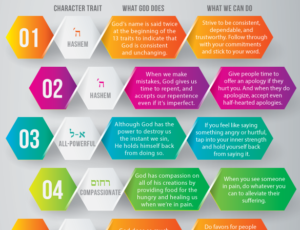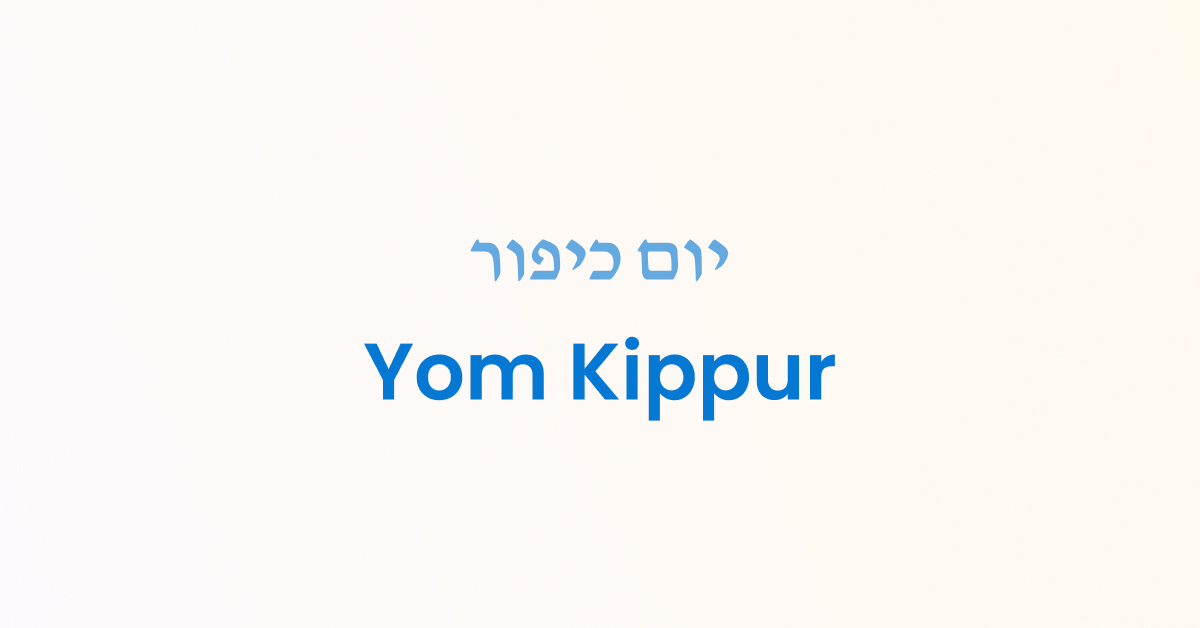We are now in the middle of the Aseres Yimei Teshuva, and Yom Kippur is rapidly approaching. We have already crowned Hashem as our King on Rosh Hashanah, expressed our deep aspiration to reveal His Kingship in this world, and hopefully also committed to taking one small step toward changing our habits, to show Hashem that our desire to grow is really sincere.
How else can we make sure to be sealed in the Book of Life?
The 13 Attributes of Mercy
After the Jewish people sinned with the Golden Calf, Hashem taught Moshe about His 13 Attributes of Mercy as a way to earn forgiveness for the Jewish people. This is the list that we recite many times on Yom Kippur, beginning with “Hashem, Hashem, Keil, Rachum V’Chanun… Hashem is all-powerful, compassionate, merciful, gracious…”
The Gemara1 writes: “Hashem taught Moshe the 13 Attributes of Mercy, saying: Whenever the Jewish people sin, they should do this procedure before Me, and I will forgive them.”
When we “do” the 13 Middos, Hashem will forgive us.
On a basic level, this means that if we merely recite this list of 13 Middos, Hashem will forgive us. But the Sifsei Chaim2 points out something much deeper:
Hashem didn’t say, “Teach the Jewish people to SAY the 13 Middos” – rather: “Teach them to DO the 13 Middos!” It’s not enough to just mindlessly rattle off the 13 Attributes of Mercy; rather, we must try to imitate Hashem’s 13 Middos in our own daily interactions.
Hashem is Erech Apayim – He has tremendous patience. We, too, should have patience when people take a long time to understand what we’re saying, or when they take a long time to apologize after they have hurt us. Hashem is Rav Chessed – He does abundant kindnesses. We, too, should actively seek out opportunities to do chessed for others. Hashem forgives our sins even when we mess up over and over. We, too, must forgive other people even when they make the same mistakes repeatedly.
If we emulate Hashem’s 13 Middos in our relationships with family and friends, He promises to mirror our behavior and deal mercifully with us, too.
If we emulate Hashem’s 13 Middos in our relationships with family and friends, He promises to mirror our behavior and deal mercifully with us, too.
Developing a Personal Connection to the Middos
Imagine Shmuel walks into shul with a scowl on his face. He pushes through all the people standing in his way to get to his seat. He snarls at the guy sitting next to him. He looks with disdain at his neighbor sitting a few rows back, notices his neighbor’s fancy watch, and thinks, “Whew, what a show-off.” Then Shmuel opens his siddur for Slichos and starts to call out, “Hashem, Hashem, Keil, Rachum, V’Chanun… Hashem, You are a merciful G-d, gracious, patient, kind, truthful…”
How do you think this looks to Hashem? Clearly, it’s not the most pretty picture. In fact, it might seem downright appalling. How can Shmuel turn to Hashem, begging for mercy and kindness, when Shmuel himself has just acted so cruel?
In order to achieve maximum forgiveness through Hashem’s 13 Middos of Mercy, we must first integrate the 13 Middos into our own personalities. If we become kinder, more patient, and more forgiving people, Hashem promises to be kind, patient, and forgiving with us, too.
Middah Kineged Middah
Actually, the fact that Hashem mirrors our behaviors is part of a larger, more global principle called Middah Kineged Middah3: Hashem treats us in the same way that we treat other people. If we treat people kindly, Hashem will treat us kindly, too. If we judge other people favorably, Hashem will judge us favorably, too. If we are understanding and forgiving when people make mistakes, Hashem will forgive, us, too.
Hashem treats us in the same way that we treat other people.
Chazal teach us this secret: “Kol HaMaavir Al Midosav, Maavirim Lo Al Kol Pi’sha’av – If a person “passes over” (i.e. overcomes) his bad middos, then Hashem will “pass over” (i.e. forgive) all of his sins!”4
If a person “passes over” (i.e. overcomes) his bad middos, then Hashem will “pass over” (i.e. forgive) all of his sins!”
What does it mean to “pass over” your middos? Rav Dessler5 says that these words of Chazal are not directed toward someone who never experiences feelings of anger, jealousy, or frustration at all. Rather, Chazal are speaking to regular people like us who sometimes feel angry, frustrated, or impatient.
Since it’s nearly impossible to totally uproot these bad feelings from our hearts, Chazal are telling us that we must try at least to “pass over” the bad middah. Just as a person is able to drive down the street even when there’s a blockage in the road – as long as he can “pass over” the blockage or pass around it – we, too, must make sure that our bad middos don’t turn into obstacles that fully block our paths of love and understanding toward other people.
Chazal are telling us that we must try at least to “pass over” the bad middah.
There will always be times when we feel angry, hurt, or frustrated. But the key is to prevent those bad feelings from taking up 100% of the space in your heart. Try to leave a tiny drop of room for feelings of understanding and connection to pass through.
One day, Eli comes home from work, and his wife, Chani, greets him at the door. “I’m so happy you’re home!” she exclaims. “I’ve been waiting all day to tell you what a crazy thing happened to me today!! I was driving to the store this morning, and when I looked in my rearview mirror, I saw a whole swarm of ducks that were flying–“
But before Chani can finish her sentence, Eli has already walked away. He goes into the other room and starts taking off his coat and flipping through the mail.
Chani feels so hurt. She feels her anger rising in her throat and all her muscles tighten. “I can’t believe Eli isn’t listening to me again!” she seethes inside. “I always listen to HIM whenever HE tells me about HIS day. Why doesn’t he ever listen to MY own stories? He is so insensitive! He doesn’t care about me at all!”
At this point, Chani has 2 choices. She can either continue to feed into her thoughts of anger, going on and on about how Eli is so insensitive, and she can re-hash in her memory all the times when he didn’t listen to her stories in the past….
OR Chani has a different choice: Instead of letting her anger create a total “blockage” in her heart, Chani can try to “pass over” her anger by making room for a bit of understanding:
“I feel so, so angry. It really hurts to feel like I’m being ignored. But at the same time, I can understand a little bit why Eli might have walked away. Maybe he was really tired and hungry when he came home and he just didn’t have the energy to listen to my story. Or maybe he had a really bad day. It’s still hard for me to feel ignored, but I can understand a little why Eli might have done that. In general, Eli is a sensitive person, and sometimes he just isn’t in the best mood. We all have hard days sometimes.”
When Hashem sees Chani’s valiant effort to pass over her middah of anger, Hashem proudly thinks: “I am forgiving, and I have taught the Jewish people to follow in My ways. Because Chani is forgiving of her husband, I, too, will forgive her of her sins.”
Throughout Yom Kippur and the Aseres Yimei Teshuva, we recite Hashem’s 13 Middos many, many, many times. Chazal instituted that we say them so many times so that we’ll have ample opportunity to learn about His middos and figure out how to integrate these incredible middos into our own personal lives.
In the few days we have left until Yom Kippur, let’s try to emulate Hashem’s 13 Middos as much as we can. The more we deal kindly, patiently, and forgiving of other people, the more Hashem will deal kindly with us in return and forgive us for our sins.
Sources: [1] Rosh Hashana 17b; [2] Sifsei Chaim: Moadim Vol. I. pgs. 202 and 207; also Raishis Chochmah Shaar Ha’Anavah: Chapter 1; [3] Sotah 8b; also see Ramban on Shemos 3:13 and Daas Torah Devarim I. pg. 93; [4] Rosh Hashana 17a; [5] quoted in Sifsei Chaim ibid. pg. 215
Your Challenge
Emulate Hashem’s Middos as much as you can.
For example:
- If you feel like saying something angry or hurtful, hold yourself back from saying it. (KEIL)
- When you see someone in pain, do whatever you can to sympathize or alleviate their suffering in some way. (RACHUM)
- Demonstrate patience for other people. Or, if someone angers you, have patience – don’t react immediately. Give yourself time to cool off before responding. (ERECH APAYIM)
- Do “free” favors for people or offer a smile or compliment “just because” … because YOU want to be a nice person, regardless of whether they deserve it or not. (RAV CHESSED)
- Be consistent, dependable, loyal, and reliable. Follow through with your commitments, and stick to your word. (EMES)
- If someone does a favor for you, find a way to pay them back or at least express sincere appreciation. (NOTZEIR CHESSED L’ALAFIM)
- If someone apologizes to you, accept their apology and grant them forgiveness. (V’NAKEH)
- Judge someone favorably. (DAN L’KAF ZCHUS)
Click on the image below for a chart that explains how to emulate each of Hashem’s 13 Middos.






